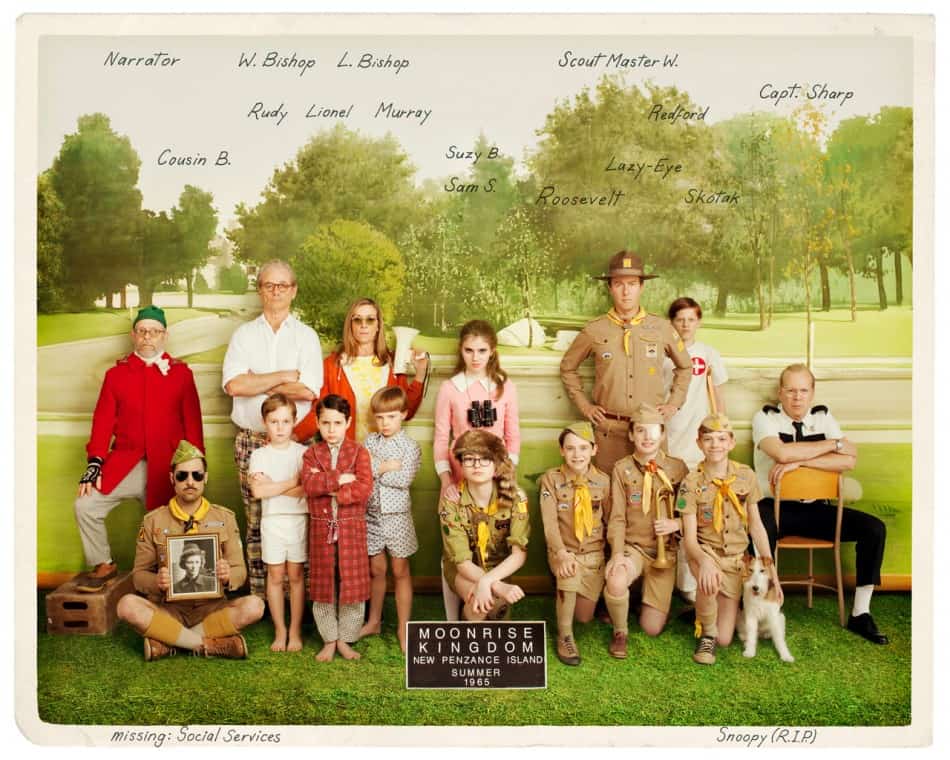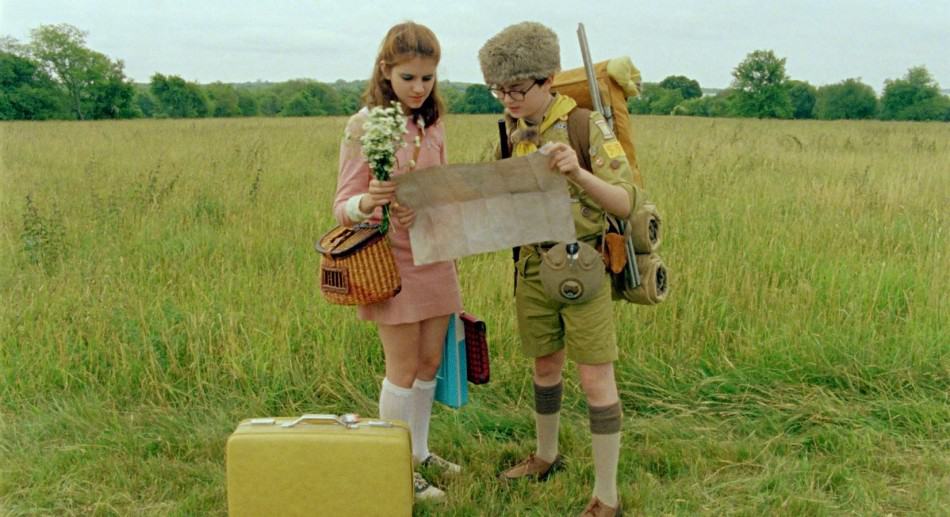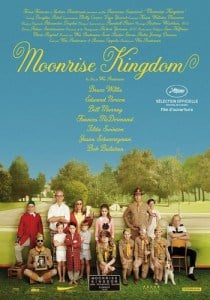Rewind 10 years. I had been a Jesuit for less than a month when I was faced with what was, for a twenty-year-old hipstellectual-in-training, a momentous decision. It was my turn to participate in the our house’s weekly custom of “Get To Know Me Theatre.” No big deal, right? Wrong: big deal. “All” I had to do was select a movie to define and introduce myself to twenty other young men with whom I had recently become brothers. How was I to find a movie that perfectly encapsulated that I was both fun-loving and serious, both youthful and mature, both off-beat and not too artsy or intellectual? Most of all, how was I going to find a movie that showed exactly how authentic (heart-breakingly, importunately authentic, mind you) I was?
Is it any surprise I turned to Wes Anderson? (Apparently not. Please click on this link now). I selected Rushmore, Anderson’s humorous and offbeat story of a high school overachiever with delusions of grandeur. After all, while I was never president of the Rushmore Beekeepers, I had played a less than instrumental role in the founding of my alma mater’s British Humor1 Club, an extracurricular quirky enough to be included in an Andersonian montage. And (truth statement forthcoming) I appreciated Rushmore’s depiction of how, in the end, success comes to those who face the world with their true selves rather than with grandiose projections.
***
Fast-forward to the present. I still get excited when a new Anderson offering comes out (although, ever since the befuddlement of Life Aquatic, I also get a little nervous as well). Which brings me, at long last, to Moonrise Kingdom (which, on the strength of generally positive reviews, I even went to see in a theater).
I’m rooting for Anderson from the moment the impeccably formatted curly cues of the opening credits rise up on the screen. My nerves rise up, higher, not quite that high, perfect… and then relief. Anderson connects! Smiles in the darkness! Excitement all around!
Needless to say, I really like the movie. I even use a little flashlight pen to jot in my notebook “This movie – second best Wes Anderson film ever?” It just might be.
***
Moonrise Kingdom is set in 1965 on an island off the coast of New England. It follows the attempts of two in love 12 year-olds, Suzy and Sam, to run away together. During their escape they live off of the survival skills that Sam has learned as a member of the “Khaki Scouts.” (As a former Boy Scout, I must say I love that Anderson gazed deeply into the soul of international scouting – and identified khaki as its essence.) Meanwhile Suzy provides a literary urbanity to the expedition by bringing a portable record player and a suitcase full of archetypically escapist YA books stolen from the library. Together they make their way to an isolated tidal inlet where they set up a camp which quickly becomes an Andersonian Shangri-La of young love.
Unfortunately their utopia does not last long. But Sam and Suzy’s adventurous bond does play the foil to the disaffected loneliness exhibited by the adults in the movie, who scramble to find – and separate – the two as quickly as possible. Their initial disappearance is discovered by Scoutmaster Ward, played delightfully by Edward Norton (may this be the first of many times that he and Anderson work together!). The Scoutmaster and other adults, including a police captain played by the pleasingly thin-haired Bruce Willis and the unhappily married parents of Suzy played by Bill Murray2 and a domineering Frances McDormond, begin organizing search parties to find the children and end the escape.
It was while watching the search parties organized by the adults that I began to feel unsettled. Was I supposed to root for the children to escape the clutches of these well-meaning, but dysfunctional, adults? Or should I align myself with harsh reality and the obvious fact that 12 year-olds actually require adult presence, guidance, and supervision, no matter how pure we posit their love to be? I was truly torn. To my mind, this kind of irreconcilable dilemma is the stuff of which great tragedy is made, although Anderson, with his phobia of “deep ideas,” has declined the invitation to make his movie a transcendent statement.
***
I have no such phobia. Which means that, even before I strode out of the theater, even as I lay down to sleep that night, even while I brushed my teeth the next morning, the question stayed with me, broadening and deepening. Whose side was I on? Is growing old and settling down – and inevitably settling for less than what the dreams of youth promised – necessary? Is it even commendable? So many of the books I read as an adolescent lionized the spontaneity and idealism of youth, and these virtues added vigor and exhilaration to my life at that time. Yet I can’t deny that I appreciate the stability and rootedness that have come with growing older. My eyes are not so often on the horizon, but they do view the nearby with more patience and affection than they used to.
And perhaps that is why I like Anderson’s movies so much. They scratch that itch I have for far off places without leaving behind some sense of reality. Each takes place in a sort of fantasy world which bends the laws of school plays, swearing, and clothing styles without breaking them. Anderson achieves a kind of magical realism without the magic. That is, Andersonian fantasies are recognizably similar to my own life while remaining just a touch more witty, more picturesque, more… perfect.
Perfect, that is, if you think like Wes Anderson. He is famous for micromanaging every part of the appearance of his films. Every thing we see in his movies is there because he wanted it just there. It is almost a quirky parody of divine providence – the almighty Wes creating and ordaining the way of being for each thing that inhabits the world into which we are peering. Strangely enough, this faux-divinity makes his movies – on some sort of meta-level – all the funnier for me. There are three (or four) parts to this. Yes, (part 1) the small joke where Max Fischer nonchalantly sticks his gum on the wall after attacking his best friend with bees stolen from his old high school where he was beekeeper club president is enjoyable, but realizing (part 2) that all that nonsensical nonchalance was planned by someone is even better. And then (part 3) realizing that all that means someone else thought this whole combination would be funny, just like I do, and tag onto this the fact (possible part 4) that all three of these hit one after another… well, it’s no wonder I find Anderson funnier than a grease-paint mustache.
But of course not everyone shares the same sense of humor. Plenty of folks dismiss Anderson’s aesthetic as precious and his fantasy worlds as dollhouses. And that reality check leads me back to the dilemma proposed above.
Just as a child may use YA lit to escape, a 30 year-old hipstellectual (yes, I hyperlinked that twice) such as myself can fall so in love with cleverly constructed fictions that the mundanity of daily life pales in comparison. (Although, in the case of a super-saturated Anderson film, real life literally is paler than the studio-heightened product.) I can be so in love with the directorial vision of a god who thinks just like me, that I forget what a grace it can be to be challenged by a God who voluntarily chose to create this world, with its ho-hum laws and only regular-saturated colors. Falling in love with on-screen perfection ought not come at the cost of alienating my affections from off-screen (im)perfection.
***
It is still 10 years later. And, predictably enough, I find myself identifying with Moonrise Kingdom – with Anderson himself – from a different perspective. Yes, it is good to remember and celebrate the love and passion of the young, but it is also good to remember what police captain Bruce Willis explains to Sam, “Even smart kids sometimes stick their fingers in electrical sockets, if you see what I mean. It takes time to figure things out.”
Living life on life’s terms can’t be a bad thing. After all, I love the Guy who directed this one.
— — — — —





